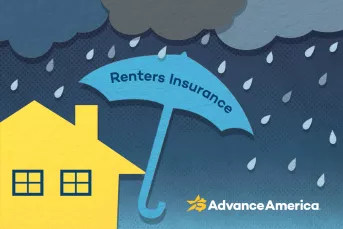
What Is Inflation, and How Does It Affect Your Money?
Inflation impacts how much everything costs from your groceries to a movie ticket. But what exactly is inflation, and what causes it? Let’s dive deeper into what inflation is, how it’s measured, what causes it, and how you can combat inflation.
Inflation definition
Inflation is the rate at which the cost of goods and services rise. Due to inflation, your hard-earned money doesn't go as far as it did in the past when it comes to buying groceries and gas, or paying for medical services or other expenses.
Since inflation has benefits and drawbacks, it’s important to understand its potential effects. By doing so, you can maximize its positives while reducing the effect of its negatives.
How is inflation measured?
The consumer price index, or CPI, by the U.S. Bureau of Labor Statistics is used to measure inflation. Through the CPI, the bureau monitors the average change in prices paid for various items across eight groups: food, housing, apparel, medical care, recreation, transportation, education and communication, and other goods and services.
What causes inflation?
There are several major causes of inflation.
Cost-push inflation
Cost-push inflation is when the costs to produce goods and services increase and lead to higher prices. This typically occurs when raw materials and labor become more expensive.
Demand-pull inflation
Demand-pull inflation happens when the demand for goods and services exceeds what can be produced at the time, causing prices to go up.
Built-in inflation
Built-in inflation refers to the idea that workers expect their wages to increase when prices of goods and services rise to maintain their standard of living.
How inflation affects your money
The most apparent effect of inflation is that it increases the cost of living. When the prices of goods and services go up, you must spend more money on your overall expenses. If you work, inflation may drive up your wages. And if you’re in debt, the dollars you use to pay it off will be worth less than when you originally borrowed money.
Tips to combat inflation
While inflation is unavoidable, there are steps you can take to reduce its impact on your financial situation.
Create a budget
A budget is a spending plan that considers your income and expenses. It can help you ensure you have enough money for your needs and wants. The most common types of budgets you might want to consider include the pay-yourself-first budget, zero-based budget, or the 50/30/20 budget.
Eliminate unnecessary expenses
There’s a good chance you may be spending some money on things or services that you don't really need or want. These may include a gym membership you never use, daily trips to the coffee shop, and cable television. Get rid of some unnecessary expenses to free up your budget.
Reduce or pay off debts
Debt can make it difficult for you to meet short and long-term financial goals. The faster you lower or repay your debts, the sooner you’ll be able to save for a house, buy a new car, build an emergency fund, or contribute to your retirement accounts.
Take on debt when rates are lower
The interest rates you lock in may determine the overall cost of your loans and credit cards. Ideally, you’d only take on debt when rates are lower. This way you can save hundreds or even thousands of dollars.
Save and invest money
There are many ways to save money. If you need to put more gas in your car, for example, take advantage of gas station rewards. To lower your grocery costs, buy in bulk or turn to local farmers. You can also cook most of your meals instead of dining out. In addition to saving your money, invest it in accounts like 401(k)s, Roth IRAs, and 529s so you can retire, pay for college, and achieve other long-term goals.
Pros and cons of inflation
Pros of inflation. The greatest benefits of inflation are higher employment rates, steady paychecks, and higher wages. Inflation can also contribute to continued economic growth and a cost-of-living adjustment if you have Social Security benefits.
Cons of inflation. The most noteworthy drawback of inflation is that you’ll pay more for goods and services. You may also see a lower return on your investments, or may face unemployment if your employer lays you off due to increasing overhead costs.
What to do if you need money now
If you’re negatively affected by inflation and need extra cash, Advance America offers quick and easy Cash Advances and loans that can help you in a pinch. These include payday loans, installment loans, title loans and a line of credit.
You can fill out an application online or in any store in just a few minutes. Upon approval, you may receive the funds you need as quickly as the same day you apply.
Notice: Information provided in this article is for informational purposes only. Consult your attorney or financial advisor about your financial circumstances.


